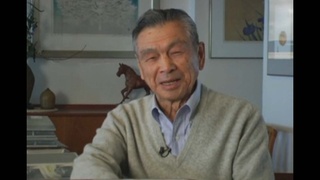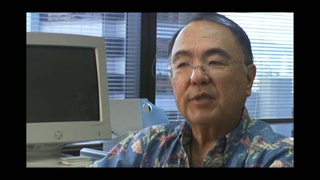Interviews
Difficulty getting work during World War II
Impossible to get a job, of course, you know. I had to get a job because, you know, financially, I had the…we didn’t have any more income because my father didn’t have the store any more and so on. So I went around looking for job and no one would give me a job. One person says, “If I hired you, you know, somebody will throw a brick through my window.” That is the kind of prejudice I faced in Salt Lake City.
But there were some others that were nicer. And then I think the shortage of help – just help…I went to work as a salad maker for University…Hotel Utah. Hotel Utah, which is still there, I think. And I worked there during my summer time for a while. I had several different jobs. I was able to get because there was such a shortage of help, you know, because all the men were gone to war and so on.
And then I finally got a job on a country club – golf course, private, Utah, Salt Lake City Country Club. Watering trees. But then there were some members of that club objected to the superintendent who hired me. You know, running the crew and he stuck up for us and said that, you know, “Where are you going to get anybody to water the trees if let these people…fire these people?” But there was a strong feeling about having any Japanese working on the country club. Maybe they felt they might sabotage the greens. So anyway, I finally got promoted to mowing the greens. You’ve got to remember there are 19 greens, including the practice green. Every morning, I got very early up in the morning and you had to sort of jog from green to green because you won’t be able to cover the whole place before the golfers start. So I cut all the greens for 2 summers.
That was while I was going to school. Then I had other job of…got a job correcting economic papers, you know, blue book. We call it “blue book.” Blue book and reading the term papers. It was a terrible job. 75 cents an hour I got in the school doing this job, 75 cents an hour. And I’d take home this stack of blue books and grade them and so on. I hate to brag, but only one test was upgraded by the teacher. Because they come complain, you know, and he would look at my grading and agree with my grading.
Date: December 8, 2005
Location: Oregon, US
Interviewer: Akemi Kikumura Yano
Contributed by: Watase Media Arts Center, Japanese American National Museum.
Explore More Videos


Less information about Hawai‘i in mainland
(b.1944) Founder of Kobayashi Group, LLC

A teenager's memories of how a local newspaper misrepresented Japanese Americans
(b. 1925) Draft resister

The role of the media in influencing people's opinions
(b. 1925) Draft resister

Reaction to a 1942 speech by Mike Masaoka, Japanese American Citizen League's National Secretary
(1915 - 2011) Nisei florist who resettled in New York City after WW II. Active in Japanese American civil rights movement

First learning about the incarceration experience in college
(b. 1955) Lawyer

Feeling angry upon reading of Supreme Court case, 'Korematsu v. United States'
(b. 1955) Lawyer

Reasons for conformity and competitiveness in Gardena, California
(b. 1946) Lawyer

Search of family home by the FBI following the bombing of Pearl Harbor
(1937 - 2021) Teacher


Not recognizing father after reunion at Crystal City, Texas
(1937 - 2021) Teacher

A child's memories of activities at Crystal City, Texas
(1937 - 2021) Teacher

Hearing about Pearl Harbor
(b. 1921) Nisei veteran who served in the occupation of Japan

Japanese American railroad workers are fired following the bombing of Pearl Harbor
(b. 1923) Chick sexer

“Work hard at the job you’re at”
(b. 1931) U.S. Former Secretary of Transportation
